Daniel Löcker
Although it is true that translations of books by Hans de Beer (Der kleine Eisbär), picture books by Ingrid and Dieter Schubert and the history of the Quakers (The peaceable kingdom) by Jan de Hartog were distributed in Austria in the 1980s via book clubs and German publishing houses based in Vienna, it cannot be claimed that Dutch literature was really visible in Austria in this period. This picture changed from the nineties onwards.
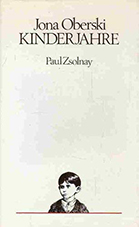
In the 1980s, publishers like Obelisk and St. Gabriel tried to reproduce the success of Miep Diekmann in Germany. However, instead of a major break through, only translations of individual titles were achieved. The Viennese publishing house Jugend und Volk, which had been publishing titles from the Dutch-speaking world since the 1940s, was somewhat more successful. It published several editions of Helen Kernkamp-Biegel's stories about Trine the horse to love.
Despite being the publication of an individual title, Jona Oberski's Kinderjahre is remarkable. The book was published by Paul Zsolnay in Vienna, which was not yet part of the Hanser Group. Maria Csollány's translation of the story of Jona who survives Bergen Belsen laid the foundation for Oberski's success in the German-speaking world. The book was reprinted again and again in Germany in the following years.
From the nineties onwards

Daniel Löcker
In the 1990s, the image of Dutch literature in Austria changed. With translations of works by Willem Jan Otten, Nelleke Noordervliet, Guido Van Heulendonk and Koos van Zomeren, fiction from the Netherlands and Flanders got more attention, but the focus of interest among Austrian publishers continued to be children's and youth literature. The Picus-Verlag, which had a special interest in picture books with artistic pretensions, ventured a completely new beginning with translations from the Dutch at that time. The most active translator for Dutch literature of this publishing house was Daniel Löcker (°1967 in Munich). Daniel Löcker studied history, communication and media at Vienna University and also holds a Master degree in Political Management. In a few years he became the most important translator of Rindert Kromhout and Paul van Loon in the German-speaking world. (#Translators)
Paul van Loon
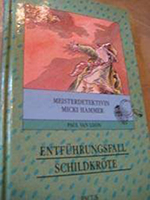
A long series of translations from Dutch was started by Picus-Verlag in 1990 with Entführungsfall Schildkröte [Abduction Case Turtle]. It is the first part of the series 'Master Detective Micki Hammer' by the Dutch master of horror stories Paul van Loon. Within four years, six parts of this series were published by Picus. After collaborating on part six, Daniel Löcker took over the Van Loon programme at Picus continually presenting new monster and vampire stories to young Austrian readers. The series opens with Wer hat schon Angst vor Vampiren! [Who’s Afraid of Vampires!] (1996) immediately followed by Der Vampirklub [The Vampire Club] and Die Vampirschule [The Vampire School], both published in 1997. Van Loon's story Du bist genau wie ich! [You Are Just Like Me!] from the same series, about the small, black Fleda with sail ears and pointed teeth who is on a quest to find another animal that wants to be related to her until Dracu the vampire confesses that bats can become vampires too, attracted special attention in the Wiener Zeitung:
"As in all his vampire stories, Paul van Loon manages to impress with the little black night creature in an endearingly sympathetic way" (Ertl, 2000).
Rindert Kromhout
The first works by Rindert Kromhout were already published in Austria at the end of the 1980s by Annette Betz-Verlag (then still based in Berlin, now part of G&G-Verlag in Vienna). When the first translation by Dutch author Rindert Kromhout was published by Picus, Kromhout was already very well known in the German-speaking world. Kromhout, whose work has been translated into many languages and won various prizes, had made his debut in the German-speaking world together with Veronica Hazelhoff, who was also widely translated, with the anthology Oma, Punk & Warenhaus. This publication was soon followed by the stories of Merel and her toy dog Alexander. The stories of the bandit Bert and the adventures of Olaf the Robber were also quite successful in Germany, the latter in translation by Mirjam Pressler, also known as the translator of The Diary of Anne Frank.

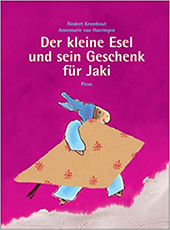
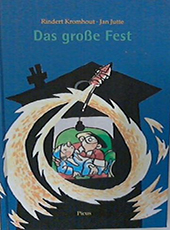
"In just a few words, Kromhout very sensitively sketches small problems and big feelings that every child is sure to have. These are, for example, the fear of being alone, the joy of seeing loved ones again, friendships. With a lot of humour and very appealing pictures, his books have thrilled me and I have heard the same from many parents." (Daniel Löcker).
Kromhout's first two books at Picus-Verlag were published under licence by Fischer Taschenbuch-Verlag. They are Katzen fangen [Catching Cats] - about Lies whose mother keeps cats in the barn - and Oskars sonderbare Gäste [Oskar's Strange Guests], a story about unemployment and about Oskar who would like to collect and keep as many animals as he can at home. Daniel Löcker's first translation of Kromhout was published in 1999. Das große Fest [The Great Feast] tells the story of Bill who falls ill during the New Year festivities and is cared for and comforted by his friend Will. In the same year, another story of Bill and Will (Was will der Dieb in unserem Haus? [What Does the Thief Want in Our House?]) was published, again translated by Daniel Löcker but this time in cooperation with Picus’ publisher Dorothea Löcker. In 2001 the publication of Was für eine Geschichte! [What a Story!] followed. Daniel Löcker really attracted attention with his translations of the stories of a little donkey that wants to be big. In 2003 Löcker's Der kleine Esel und sein Geschenk für Jaki [The Little Donkey and His Present for Jaki] (2002) was crowned with the Austrian Children's and Youth Book Prize - a prize awarded annually for the most successful children's and young people's book of a production year.
Els Rooijers
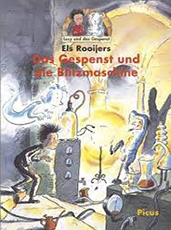
Daniel Löcker translated three ghost stories by Els Rooijers. In Die geheimnisvolle Gespensterkutsche [The Mysterious Ghost Garriage] (1999), Lucy, a specialist in spooky stories, is visited by ghosts; in Das Gespenst im Bett [The Ghost in the Bed] (1999), a ghost escapes from an old box; and in Das Gespenst und die Blitzmachine [The Ghost and the Lightning Machine] (2001), Lucy and her ghost friend Albrecht have to deal with intruders at Rabenburg Castle. But at the end of the 1990s there are remarkable changes. The translation of the adventures of Kim, who encounters real pirates, is not published by Picus anymore, but as paperback by Fischer (1999). This is also the case for Tobbe und der Kampf um den Zauberstein [Tobbe and the Battle for the Magic Stone] (2002), about Tobbe who wants to save his sick magician grandmother and has to overcome the power of the witch Übelia to do so, which was not translated by Daniel Löcker but Marion Klunker instead.
Important impulses
In addition to Van Loon and Kromhout, Daniel Löcker has made a whole series of works by other authors of children's and youth literature from the Dutch-speaking world known in Austria. In most cases, he presented individual titles by authors already known in German-speaking countries. This applies, for example, to the work of Henk Hokke as well as to the Dutch author Trude de Jong, whose Lola der Bär [Lola the Bear] was a great success in the German-speaking world. From the works of Trude de Jong, Daniel Löcker also translated Ein Kätzchen für Daniel [A Kitten for Daniel], the story of a somewhat different boy who loves kittens rather than motorbikes. From the works of the very successful Anke de Vries, Daniel Löcker translated for Austrian readers Trau dich doch [Do you dare?] and Mein Hund Flip [My dog Flip], about Flip the dog that never barked. Daniel Löcker translated Rätselhafte E-mails für Tim [Mysterious Emails for Tim] the exciting story of Tim, who receives emails intended for another person and therefore sets out to find them by Martine Letterie, who is well-known in Germany for her stories about Robin, the brave son of a knight.
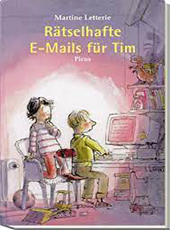
Several times Daniel Löcker gave important impulses with his translations. The first translation of Liesbeth van der Jagt and Anton van der Kolk in the German-speaking world was done by Daniel Löcker, as was the first translation of Lian de Kat. In 1999, he translated the story of Lili who doesn't get a dog and therefore invents one (Der unsichtbare Hund [The Invisible Dog]). Daniel Löcker also successfully introduced Roswitha Wiedijk to the German-speaking world with Ein echter Vampirfilm [A Real Vampire Film] (1998). Löcker also achieved comparable success with the stories about Flora, who wants to make her own decisions, by Marjon Hoffman (2004,2005).
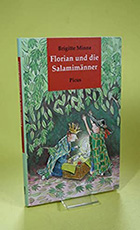
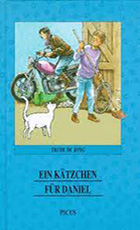
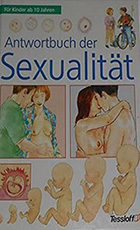
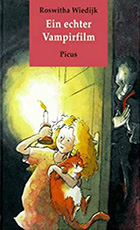
Daniel Löcker also set important accents with the Flemish author of children's books, plays and screenplays, Brigitte Minne, who has won many awards and been translated into many languages. Brigitte Minne was introduced to the German-speaking world with her Antwortbuch der Sexualität [Response Book of Sexuality] (1994), but as a children's author she was introduced by Daniel Löcker. With Florian und die Salamimänner [Florian and the Salami Men] (1997) Löcker laid the foundation for her success in the German-speaking world. Picus obviously did not succeed in binding the author to the publishing house. Brigitte Minne's other works were published by various publishers, two of them in Austria (Residenz, St. Gabriel).

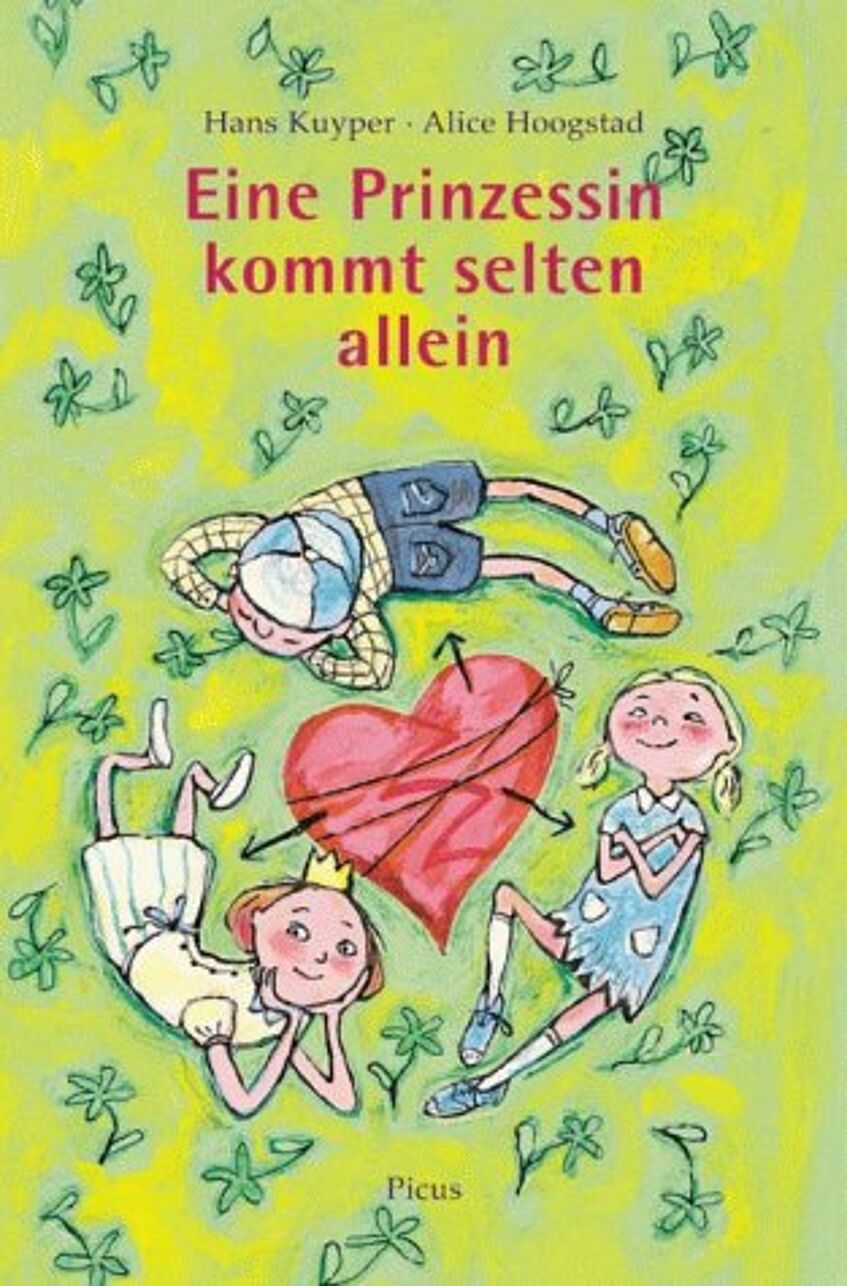
"[With Eine Prinzessin kommt selten allein] Hans Kuyper has written a cheeky, unconventional story about first love with a surprising approach to solving an all too familiar problem." (Thuswald, 2007, p. 12.)
A controversy arose around Eine Prinzessin kommt selten allein [A Princess Rarely Comes Alone] (2000). In 2001 the translators Daniel Löcker, Alice Hoogstad and the author Hans Kuyper were awarded the Austrian State Prize for Children's and Youth Literature for this book, but Hans Kuyper and Alice Hoogstad refused the prize because of the participation of Jörg Haider's Free Democrats in the Austrian government at that time. Despite this, Löcker once again laid the foundation for an author's breakthrough with his work, not only in Austria but also in Germany (in 2004 Zu dritt im Dunkeln [Three in the Dark] was published by Picus).
Daniel Löcker shaped the image of Dutch children's and youth literature in Austria like no other, and it’s a pity that he hasn’t published any translations of further Dutch titles since 2005. Currently (2021) Daniel Löcker works as 'Deputy Head of the Department of Culture & Science of the City of Vienna'.
(Herbert Van Uffelen)
References
Ertl, Sabine: Du bist genau wie ich. In: Wiener Zeitung, 1.12.2000).
Thuswald, Marion: Gender-sensitive political children's books. Bm:uk, Zentrum polis, Vienna, 2007.
